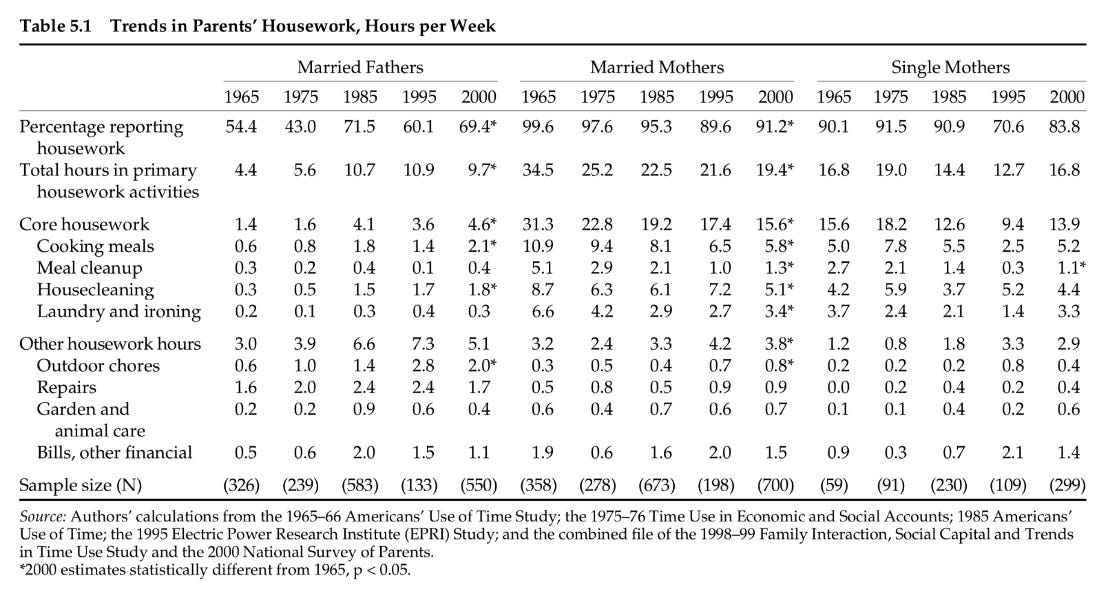Working moms today spend as much time on childcare as stay-at-home moms 40 years ago
Why do modern children suck up so much more childcare hours than in the past? And how do working moms do it?
Hello and welcome to the Joyful Parenting San Francisco newsletter. This is our first newsletter! If you’ve seen us in the Chronicle, I've since had my 3rd baby. It’s been a busy summer!
The newsletter will be sent monthly (parenting duties permitting) and includes upcoming events, personal joyful parenting moments, essays, or guides related to community infrastructure for parenting in San Francisco. Welcome to send requests or things you'd like us to share out to joyfulparentingsf@substack.com.
Upcoming events
Join our Meetup group to stay posted on events: https://www.meetup.com/joyful-parenting-sf/
SF Preschool Night: A family-friendly preschool fair on Thursday, September 28 from 6:00-8:00pm at St. Paul’s (1690 Church Street). Organized by Gabriella of Primeros Pasos Preschool. See the website for a list of preschools who will be in attendance. sfpreschoolnight.com
Parent & Kid hang at the SF Commons every Monday, 4-7pm. The space has a kids corner with toys and toddler jungle gym. Adults hang while kids play.
Work & Play at Manny's (16th & Valencia) every Thursday 11am-1pm. The café has a kids area. Parents read, write, or just chat while kids play
Working moms
Do working moms now really spend as much time on childcare as stay-at-home moms did 40 years ago? I read Changing Rhythms of American Family Life — a fascinating deep dive into time diary data — to find out. The answer, oddly, is YES. Feeling overwhelmed, yet still worried you're not doing enough? It's not you -- the data shows that parenting standards have changed drastically over the last few decades.
I was investigating this claim from Bryan Caplan’s Selfish Reasons to Have More Kids. Here’s the quote:
Back in 1965, when the typical mom was a housewife, she spent ten hours a week specifically focusing on her children’s needs. By 2000, this number had risen to thirteen hours a week. This happened despite the fact that today’s moms are much more likely to work outside the home, despite the fact that moms have fewer kids, and despite the fact that dads are a lot more helpful. Everything suggests that modern moms would put in fewer hours than ever—except the facts.
One pattern hasn’t changed: Stay-at-home moms spend more time with their kids than working moms. However, both kinds of moms try harder than they used to. Stay-at-home moms went from about eleven hours per week in 1975 to seventeen hours per week in 2000. Working moms went from six hours per week in 1975 to eleven hours per week in 2000. Modern working moms spend as much time caring for their kids as stay-at-home moms did thirty years ago.
— Caplan, Bryan. Selfish Reasons to Have More Kids (p. 20). Basic Books. Kindle Edition. 2011.
Working moms spent 10.6 hours a week on focused childcare in 2000 - as much as stay at home moms in 1975
Caplan correctly portrays the data from Changing Rhythms. Working moms spend as much time on focused childcare (10.6 hours per week) in 2000 as stay at home moms did in 1975 (10.7 hours per week). This only counts time when childcare is the primary activity. That is, if you are cooking while keeping an eye on the kids, it doesn’t count as focused childcare.
Many more moms are working now than before, though moms are more likely to be part time than dads. Looking at mothers with at least one child less than 18 years old at home:
1975 - 56.1% of mothers were employed, and all moms worked 606hrs/yr on average
2000 - 78.1% of mothers employed, and all moms worked 1172hrs/yr on average
Interestingly, between those years, the amount of time spent on childcare dipped until 1985, as the baby boom wrapped up and people had less children per family, before rising again.
(Note that this chart has a higher numbers for childcare hours because it averages working and non working parents)
Mothers work more AND do more childcare… what did they give up on?
Where's the time coming from? Turns out what women give up when pressed for time is: HOUSEWORK! The amount of housework done by married mothers -- a staggering 34.5 hours a week in 1965 -- has converged down to 19.4 hrs/wk, about the amount of housework that single moms do (16.8 hrs/wk). Other than housework, time spent with spouse and civic participation are other areas where working moms spend less time in 2000 compared to 1975. Were spousal relationships better in the 60s and 70s? Who knows. My marriage is definitely in better shape when I can afford to spend one on one time with my spouse regularly.
The decline in civic participation has been well documented by Robert Putnam in Bowling Alone:
The frequency of virtually every form of community involvement measured in the Roper polls declined significantly, from the most common—petition signing—to the least common—running for office. Americans are playing virtually every aspect of the civic game less frequently today than we did two decades ago.
It’s unclear how much of that decline is attributable to mothers working more while also doing more childcare.
Mothers multitask harder
Are people also multitasking more so that they can work while maintaining the same amount of childcare hours? Yes: The time diary data recorded both "primary" and "secondary" activities to gauge multitasking. Multitasking across all parents has increased since 1975.
Men and women recorded the same hours multitasking but women are more likely to report FEELING that they are multitasking most of the time, which the authors speculated could be because "mothers move faster" (get more done) or that they are underreporting secondary activities.
Why more focused childcare?
Modern children suck up more childcare time now for a variety of reasons:
There is “increased cultural and normative pressure to provide large amounts of time to children to be considered good parents”. Parenting is much more intense now that it has been in the past.
Parents hover constantly -- chaperoning play dates, etc. No longer can you let your kid roam the neighborhood without someone calling CPS on you. What is a neighborhood these days anyways? People don’t know their neighbors like they used to.
(chart from Pew Research)
Anyways, if you feel guilty of not spending enough focused time with your children, know that you’re doing an incredible amount of work — much more than moms in the same position did 40 years ago. And if there’s any way you can trade doing less — less housework, less hovering, less logistics — for more joy — more time with your spouse, more time to connect with your community — the kids will still be alright. ❤️
Footnote for dads: Adding together “market work” and “non-market work” — meaning, work in the home — married dads and moms work the same number of hours. However, that’s increased by nearly an hour per day for moms, and over half an hour a day for dads since 1965. So yes, dads are more involved now than ever, and to accommodate this they are working slightly less and giving up some leisure time.
Finally, shoutout to my little reading buddy, pictured at the SF Commons where I did most of my reading with friends.
For more joyful parenting events and content, follow us on Meetup.com, Twitter, or Instagram
[social media thumbnail courtesy of Ketut Subiyanto, creative commons licensed]








Fascinating, data-based perspective to what many modern parents are feeling! The role of social pressure feels particularly real.